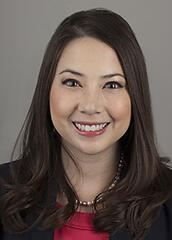The benefits
The Medical Language Program aims to provide students with the same learning experience and scaffolding as the foundational Practice of Medicine course. It provides consistency with the key content already taught in English around how to lead clinical encounters with patients. The students are usually heritage speakers or second language learners, so the purpose of the Medical Language courses is to teach clinical terminology that would not have been learned in a regular language course without the framework of a medical setting. Faculty focus primarily on oral communication and have built a network of native speakers for students to practice with. While participating students are not expected to be fully proficient practicing medicine in another language following the courses, the program is intended to reinforce the material, provide foundational profession-oriented language skills, teach best practices for working with interpreters, and impart attitudes and skills to advance cultural humility with a diverse patient population. The courses also provide greater context for understanding cross-cultural challenges patients may face and better equip students to manage culturally specific dynamics.
“This program is a real gem in the HMS para-curriculum. It is not a core requirement, but up to a third of students at HMS elect into it. I think that speaks to the diversity of our students and the priority that our students place on improving communication and interactions with people who speak languages other than English.”
The Challeges
In crafting a profession-oriented language program, it is challenging to align the curricula across languages due to the number of faculty involved. It is also difficult to assess language proficiency when there are no standardized benchmarks or tests for medical students. Dr. Molina notes that she is “persistently puzzled” by how to measure proficiency in ways that matter for clinical care and how to be most consistent in assessment for students who are still learning clinical medicine.
Takeaways and best practices
-
Align offerings to student interest and skill level. Unlike core academic courses or other electives, profession-oriented language programs should be tailored to the skills of the current student body. Planning challenges do arise because program directors cannot plan offerings far in advance, but this maximizes the effectiveness of the program and ensures that the needs of as many students as possible are met.
-
Supplement foundational content. The purpose of profession-oriented language programs should be to reinforce the core content that students have already learned in English, rather than introduce new medical concepts.
-
Cultural sensitivity is key. In delivering high-quality medical care, language skills alone are not sufficient. It is crucial for students to also learn about culturally specific contexts and how to approach sensitive conversations with patients and their family members. For example, in the Medical Language courses, students may learn how to best discuss end-of-life care or diet in culturally responsive ways.
Bottom line
Profession-oriented language training is important for advancing equity, and many Harvard students are eager for the opportunity to be equipped to serve members of their communities in this capacity.
 Dr. Rose Molina, Assistant Professor of Obstetrics, Gynecology and Reproductive Biology and Director of the Medical Language Program at Harvard Medical School (HMS), is a scholar-activist with a passion for applying language and immigration status as critical lenses for understanding and eliminating inequities in maternal health. While HMS has a long history of medical language trainings, many were dependent on student leadership rather than supported by the administrative infrastructure required for sustainability and growth. In 2018, HMS established a formal Medical Language Program as part of the Office of Scholarly Engagement with the goal of building a multilingual physician workforce to advance health equity. The program includes Intermediate and Advanced Medical Spanish, Intermediate Medical Mandarin, and Intermediate Medical Portuguese taught by HMS faculty. Pilot courses in Intermediate Medical French and Beginner Medical American Sign Language courses were held in Fall 2022. The Program also runs an Intensive Medical Spanish course in September and October each year for students who have completed their clerkships. Course offerings are tailored each year to the language needs of incoming students.
Dr. Rose Molina, Assistant Professor of Obstetrics, Gynecology and Reproductive Biology and Director of the Medical Language Program at Harvard Medical School (HMS), is a scholar-activist with a passion for applying language and immigration status as critical lenses for understanding and eliminating inequities in maternal health. While HMS has a long history of medical language trainings, many were dependent on student leadership rather than supported by the administrative infrastructure required for sustainability and growth. In 2018, HMS established a formal Medical Language Program as part of the Office of Scholarly Engagement with the goal of building a multilingual physician workforce to advance health equity. The program includes Intermediate and Advanced Medical Spanish, Intermediate Medical Mandarin, and Intermediate Medical Portuguese taught by HMS faculty. Pilot courses in Intermediate Medical French and Beginner Medical American Sign Language courses were held in Fall 2022. The Program also runs an Intensive Medical Spanish course in September and October each year for students who have completed their clerkships. Course offerings are tailored each year to the language needs of incoming students.
